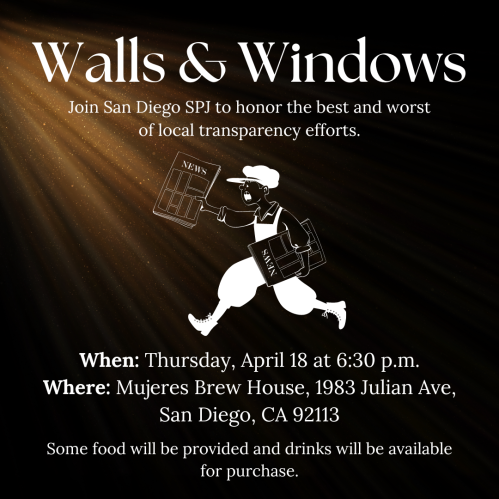
Every year, the San Diego Society of Professional Journalists hosts our Walls and Windows event to honor those in our community who have worked hard to expand the public’s right to know by fighting for transparency — and hold accountable those who have stifled these efforts.
Join us on Thursday, April 18 to hear from the awardees and mingle with other local journalists! Some food will be provided and drinks will be available for purchase.
When: Thursday, April 18 at 6:30 p.m.
Where: Mujeres Brew House, 1983 Julian Ave, San Diego, CA 92113
Window Award: Emily Cox, San Diego Superior Court
SD-SPJ’s annual Window Award goes to a person or public agency that has prioritized transparency and access to information. This year’s recipient is Emily Cox, public affairs officer for the San Diego Superior Court.
In 2020, we gave a Skylight award to Emily’s predecessor, Karen Dalton, upon her retirement. “For years, it was difficult to get basic information on happenings at the San Diego County Superior Court and court officials were rarely prepared for major news events that drew large groups of reporters,” we wrote. “That reality changed with Karen Dalton.” In other words, Emily had some big shoes to fill.
But reporters who cover the court will tell you that Emily’s upheld Dalton’s legacy and then some. She responds quickly to information requests and is always available to assist reporters who have questions about court business or who need help digging into case files.
Emily launched a series of virtual town halls to help the press and members of the public better understand different types of court functions and services; she also participated in our recent Know Your Rights panel and regularly assists in organizing the annual Bench / Bar / Media panel discussions.
Sunshine Award: Will Carless, USA Today
SD-SPJ’s Sunshine Award goes to a journalist or community member who went above and beyond to make the government more transparent and hold elected officials accountable. Will Carless, a national correspondent for USA Today, has been dogged in his efforts to pull back the curtain on extremism. (Will is a former staff writer for Voice of San Diego — and once a San Diego journalist, always a San Diego journalist.)
Earlier this year, Will published an investigation into how the Department of Defense has lagged in promised efforts to root out extremists among its ranks. Though the stories didn’t directly have a San Diego tie, our region has large population of current and former military members and, as Will points out, research shows that “being affiliated with the U.S. military is the ‘single strongest’ predictor of violent extremism in America.” Despite threats to his personal safety, Will has tracked down people who participated in the Jan. 6 insurrection — including the son of the former chair of the San Diego Republican Party — and profiled the woman behind a social media account whose anti-LGBTQ+ posts have been tied to schools, hospitals and libraries being targeted by bomb and death threats.
For too long, media outlets have not taken the recent rise in extremist rhetoric and activity seriously. This, we now know, was a mistake. Will’s reporting is critically important in letting people know how extremism festers and spreads, what its consequences are and what we need to do to combat it.
Wall Award: San Diego Mayor Todd Gloria
The Wall Award goes to the person or public agency that made it difficult for journalists to do their jobs by ignoring information requests or otherwise compromising the public’s right to know. The award this year goes to the office of San Diego Mayor Todd Gloria.
The Mayor’s office has been busy over the past year coordinating responses to weather-related emergencies, grappling with an ongoing influx of migrants at the Southern border and creating new policies to address the burgeoning unhoused population in the city. Given all of the pressing issues affecting San Diego, we would expect the Mayor’s office to act with transparency by cooperating with journalists who are reporting on these urgent topics. However, we think officials have fallen short.
The Mayor’s office has developed a reputation for contacting journalists in the wake of unfavorable coverage to downplay, dispute or undermine their reporting, claiming that their important work is promoting distrust in the community. In one of many instances experienced by San Diego journalists, the Mayor’s chief spokesperson described a news story about the city’s neglect of Black and Latino neighborhoods prior to an unprecedented flood as inaccurate, “dangerous” and “harmful.” We disagree.
Multiple journalists working in print, TV and radio said they have been unfairly denied access to interviews, press conferences and site tours involving the Mayor’s office. Some described situations where the Mayor canceled or delayed interviews after critical news coverage about his administration. As one example, La Prensa, a news outlet with a history of critical coverage of Mayor Gloria, was denied access last year to tour a city-sanctioned campsite for unhoused residents, while 12 other newsrooms were invited to attend. The Mayor has declined accountability interviews about his approach to homelessness, and his office has ignored questions from reporters about the recent migrant crisis. We believe the Mayor’s office should focus more on cooperation and less on reputation management.
In addition, freelancers continue to have difficulties receiving press credentials from the San Diego Police Department, which is overseen by the Mayor’s office. Newsrooms also continue to experience issues accessing public records, a problem dating back years in the Gloria administration.
Mayor Gloria’s refusal to attend debates during the primary election is another example of a lack of openness that is harmful to both journalists and the public as a whole. We hope that this award will remind Mayor Gloria and his office that hindering journalists only hurts the people he was elected to serve.
